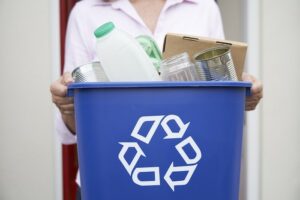The UK’s recycling system is confusing, chaotic and broken – here’s how to fix it
 Maybe you have one bin or many boxes. You might even have a compost caddy. Whatever your recycling setup, chances are that at some point you’ve been left wondering what should go where and if a particular item is indeed recyclable or if it should just go in the main dustbin.
Maybe you have one bin or many boxes. You might even have a compost caddy. Whatever your recycling setup, chances are that at some point you’ve been left wondering what should go where and if a particular item is indeed recyclable or if it should just go in the main dustbin.
Research from Wrap, a climate action charity, has found that 82% of UK households regularly add at least one item to their recycling collection that’s not accepted locally. And data from recycling facilities shows that over 16% of the recycling is contaminated.
This can include electrical goods, nappies and food, though it more commonly involves packaging caked in remnants of what was – think jars still covered in peanut butter or jam, toothpaste tubes, juice cartons, greasy takeaway packaging, damp cardboard and glittery birthday cards. Plastic pots, tubs, trays and bottle tops along with metal lids may also count as contaminants – depending on where you live.
And that’s a big part of the problem. Because what is and isn’t recyclable varies a lot from area to area. In the UK, there are 39 different bin collection regimes across 391 local authorities. Rules aren’t aligned in terms of what is and isn’t collected for recycling or how items should be prepared: washed or rinsed, crushed or not, lids on or off. It’s different everywhere.
The University’s research into the complexities of the UK’s recycling system found all these different rules and requirements have created a lot of confusion in terms of what should and shouldn’t be recycled. In some instances, this confusion can even result in people just not bothering to recycle at all.
Breaking it down
We’re also now confronted with lots of multi-material packaging – those envelopes with plastic windows and also cake boxes and crisp tubes.
While some might try and “unengineer” such items to try and separate the different material components, others make a judgement based on what something is mostly made of, meaning items can then end up in the wrong bins. If indeed you even have to separate your recyclables by type where you are. Told you it was confusing.
Then there’s also the fact that many large retailers and organisations now provide collection points to recycle certain types of plastics, such as bread bags, crisp packets and pet food pouches, (which can’t usually go in household recycling bins).
Though in principle these schemes are good, they can lead to confusion, with people thinking that if these items are collected for recycling elsewhere, they can go in the recycling bin at home.
Crackdown on confusion
In response to the issue of contaminated recycling, the UK government has plans to crack down on “wishcycling” by asking people to be more careful about what they put in their bins. Wishcycling is when people optimistically stick items in the recycling bin hoping they can be collected when in reality they can’t.
This forms part of a wider review of England’s recycling collection based on a consultation which was launched in 2021 by the Department for Environment Food and Rural Affairs (Defra) on how to improve the consistency of recycling in both homes and businesses.
Defra has said it wants to make recycling easier and more consistent so that all councils collect the same materials. This is to be welcomed, as our research has found that consistent collections across all regions alongside simplified packaging that people can understand would make it easier for householders to know they are doing the right thing.
We also found that people want a simpler system as they want to recycle more. As part of our research, we heard from people who held back plastic milk bottle tops to donate to schemes that promised to recycle them as they were not collected by their local authority. Others were storing plastic fruit netting for fear of it not being appropriately dealt with and ending up causing environmental harm.
Some were driving bin bags full of plastics out of their local authority areas to other locations where family members and friends could feed them into their household recycling collections. All of this indicates that there is clearly a thirst to recycle, limit environmental harm and live more sustainably.
Tackling the confusion around what can and can’t be recycled is also needed because it’s adding to plastics’ bad reputation. Waste professionals we’ve worked with have told us that negative consumer perceptions and the move away from plastics aren’t always helpful because alternatives can carry larger environmental footprints. Though a contentious point, it’s recognised that plastic substitutes are not always more sustainable.
Sorting out our broken recycling system is an important step if we really want to be a greener and more environmentally conscious society.![]()
- This article is republished from The Conversation under a Creative Commons license.
- Read the original article.
